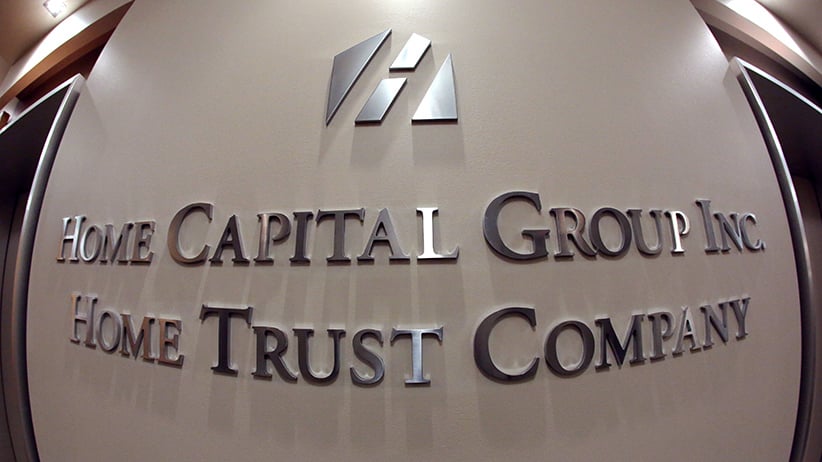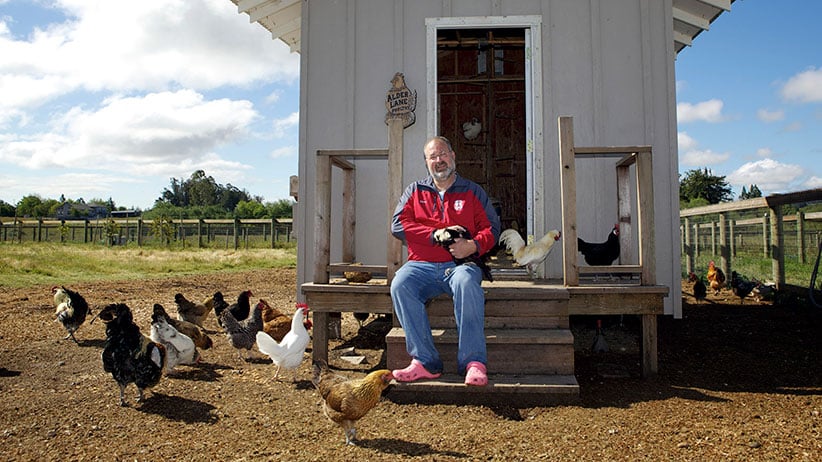The war for control of the Home Capital story
Short sellers have been scolded for stirring alarm about the lender. Did they do more harm than those who preached calm?
The entry to the Home Capital Group’s headquarters is seen at an office tower in the financial district of Toronto, Ontario, Canada May 1, 2017. Picture taken using a wide angle lens. (Chris Helgren/Reuters)
Share

Gerald Soloway must have been feeling jubilant on an earnings conference call in May 2016. It was, in fact, his last such call before retiring as CEO of Home Capital Group, the company he had co-founded 30 years ago. The alternative mortgage lender had long provided fat returns, but also found itself the target of short sellers betting the stock would crash alongside the Canadian housing market. “We don’t put a lot of time and energy into dealing with what often is false comments by the shorts,” Soloway said. But he couldn’t resist a final dig at those rooting for his firm to fail, relaying a “little ditty” about how short sellers were apparently dealt with in the 19th century: “He who sells what isn’t his’n, must buy it back or go to pris’n.”
It was just one salvo in a long-running war of words around Home Capital. The company’s stock has crashed nearly 70 per cent this year as depositors pulled funding after the Ontario Securities Commission (OSC) accused management of misleading investors. On the surface, the share price collapse marks a victory for short sellers and a painful (and unfair, some argue) defeat for long-time shareholders. For many years, a bet against Home Capital was a bet against the Canadian housing market. But Marc Cohodes, a retired U.S. hedge fund manager, added a new wrinkle to the case against the firm by alleging corporate malfeasance. “I’ve warned people for two and a-half years on Twitter, on TV and in print media,” he says. “And everyone elected to try to bad-mouth me and belittle me.”
Short sellers occupy an important yet still controversial role in public markets. They can alert investors and regulators to problems at companies, raise crucial questions, and help deflate overvalued stocks. In the past few years, a more aggressive breed of short seller has emerged, according to Ian Robertson, executive vice-president at Kingsdale Advisors, which assists public companies with communications and other matters. Rather than circulating reports among fund managers and investors behind closed doors, so-called activist short sellers are adept at deploying “shock and awe” campaigns by publicizing information and allegations on Twitter. “Bad news travels faster than good news,” Robertson says. Short sellers don’t even have to be correct to make a profit. “They can be successful even if they can create the appearance that there are things not being disclosed or dealt with by the company,” he says.
A vicious circle can then ensue: the suspicion created by a short seller drives down share prices, causing more investors to flee, thus creating even more suspicion that something is wrong. Company executives and major shareholders inevitably fight back to debunk the allegations. In the end, what matters most is which side gets its message heard—and believed.
Companies and investors can be too quick to dismiss short sellers. “What they don’t realize is that a lot of them have very good track records,” Robertson says. Citron Research, a small U.S. shop, dropped a bombshell report on Valeant Pharmaceuticals in 2015, linking the Laval, Que. firm to Enron and cutting the stock price in half over the following few days (the report, though hyperbolic, helped trigger greater scrutiny of the company.) A few years before that, another outfit called Muddy Waters Research alleged Canadian firm Sino-Forest Corp. was “a multi-billion dollar Ponzi scheme.” The accusations were met with intense skepticism, and one analyst called the Muddy Waters report “a pile of crap.” Sino-Forest eventually collapsed, and the OSC pursued fraud charges against the founder. A decision has not yet been issued in the case.
As for Cohodes, he only invests with his own money these days (he also operates a chicken farm in California, where he now lives). Each day, he wakes up at 3 a.m., logs onto Twitter and fires off dozens of missives about Home Capital under the handle @Alderlaneeggs, a reference to his farm. His profile picture is a shot of the Kool-Aid Man.

Cohodes established a short position in Home Capital in the fall of 2014, partly because of his views on the housing market, but also because of the company’s business model and lending practices. He says he’s been derided as American short seller who doesn’t understand the Canadian market, a shark looking to make a quick buck by destroying the reputation of an upstanding firm. “They wrote a f—ing Harvard Business School case study about me,” he says. “I know what I’m talking about.” One of his past shorts is NovaStar Financial, a U.S. subprime lender that fell apart amid the 2008 financial crisis, embroiled in lawsuits. “I said if I ever see anything like NovaStar again, I’m going to speak up loud. I’m going to be noisy. And I’m going to make sure whoever is out there can’t say they weren’t warned.” He rattles off his media appearances with ease: BNN, Bloomberg, CBC and CTV, not to mention dozens of articles.
Some investors stridently delivered a counter-narrative. Baskin Wealth Management, a Toronto firm, bought into Home Capital years ago, and representatives appeared on BNN to tout the stock. President David Baskin named it a top pick last August. “Home Capital ran into problems with one of its mortgage brokers who gave it some bad information,” he said, referring to how the company cut ties with 45 brokers after an internal investigation revealed borrower income and employment information had been falsified in some instances. “The market decided the whole company was going to be a fraud…Turns out not to be the case.”
In mid-April, Baskin’s chief investment officer, Barry Schwartz, also appeared on BNN. A caller asked if a drop in Home Capital’s shares represented a buying opportunity. “There’s misleading information out there promoted by short sellers that is categorically false,” Schwartz said. “If you put out misleading information, you should be punished.” He added he wasn’t about to sell his shares. (Neither mentioned Cohodes by name. “You don’t want to give the mom-and-pop shareholder who may not have seen the reports the ability to Google it,” Robertson says, speaking generally of how companies respond in such events.)
RELATED: Could Home Capital’s troubles spread? Here’s what observers think
Equity analysts covering Home Capital—who are paid to determine what will happen with share prices—hewed largely to Baskin viewpoint, too. Only one analyst currently following the stock rated it a “sell” or “underperform” in 2015 or 2016, according to Bloomberg data.
Based on Cohodes’s Twitter feed alone, it’s easy to see why some would brush him off. His stream-of-consciousness style is overwhelming, and he’s prone to sweeping statements and broad indictments of executives and regulators in Canada. Not all of his claims meet the burden of proof for investors or reporters. He has fans who tweet praise at him, and his feed can feel like an echo chamber of anonymous tweeters predicting financial doom. Not to mention that, by the standards of the insular world of Canadian finance, he’s crude. “Everyone has this arrogance in Canada that everything is foolproof,” he says. “You know what? It’s not. It’s a f—ed up place.”
But Cohodes gave a detailed presentation of his case against Home Capital last year at a high-profile investor conference, and he’ll engage with anyone who reaches out with questions. His short thesis has been built on extensive research, including multiple trips to Toronto and conversations with mortgage brokers and former employees. He shorted another Canadian firm, Concordia International, partly due to its unsustainable debt load. Its stock has collapsed 93 per cent in the past year.
Cohodes has been prescient with regard to Home Capital, too. In July 2015, he told the Globe and Mail the company wasn’t completely forthcoming about why it wasn’t hitting its targets. Days later, Home Capital revealed the broker suspensions and the negative effect on its operations. Cohodes then appeared on BNN last October and alleged management knew about the problem well before it was disclosed, and suggested a potential cover-up under something called Trillium. In April, the OSC filed a statement of allegations against Home Capital, accusing it of failing to disclose the results of its investigation into brokers for months. The name of that investigation? Project Trillium. (Home Capital denies the OSC’s allegations and intends to defend itself.)
Supporters of the company feel dismayed that short sellers have seized the narrative, contending Home Capital’s business was sound and the fallout has been an overreaction. “Home Capital has been attacked by sociopaths for no good reason,” says Ross Healy, chairman of Strategic Analysis, a capital markets research firm in Toronto. “The kinds of people who are willing to lie, cheat and steal to make money at any cost.” To be clear, he’s not talking specifically about Cohodes. “I haven’t a clue who he is,” he says. Even so, Healy insists short sellers successfully destroyed confidence in Home Capital and that they were “aided and abetted” by the OSC, which was overzealous in accusing the firm of misleading investors. Those two factors spooked depositors, and effectively led to a run on the bank. “That’s left investors in a state of panic,” he says.
READ MORE: What the Home Capital crisis reveals about the housing market
A fund manager that has held stock in the company throughout the turmoil agrees the share price collapse is unwarranted, but doesn’t entirely blame short sellers. “There’s a lot of blame to go around,” says the shareholder, who requested anonymity as the firm has a policy not to comment publicly on its holdings. “With a better response from the company, [short sellers] wouldn’t have been able to do as much damage.” The shareholder points to a number of self-inflicted wounds: poor disclosure, abruptly firing the CEO in April, and taking on financing at egregious terms, all of which gives short sellers more ammunition to sow doubt. Home Capital’s attempts at messaging fell flat, too. Former CEO Martin Reid appeared on BNN last year and casually remarked, “Fraud is part of the business.” That’s not exactly the kind of statement that instills confidence in a firm trying to distance itself from trouble.
Still, the shareholder doesn’t necessarily regret brushing off Cohodes’s views. “We don’t rely on scuttlebutt like that,” he says. “If we listen to every rumour and every negative comment on the companies that we own, we probably wouldn’t own anything.” One lesson he has taken away, though, is to speak up in the future. “The next time something like this happens with company we know, we might engage a little more with the press and help them hear another side of the story,” he says.
As for Baskin, the firm sold all of its shares in Home Capital in late April, and Schwartz, the chief investment officer, told Maclean’s it will no longer comment on the company. In a note to clients, David Baskin wrote that his team had lost confidence in management, and that the OSC’s allegations “have the ring of possible truth.” He went on, “Certainly, if the allegations are true, we were actively misled by management.” Chief investment officer Schwartz was on BNN again shortly afterward. “The information changed, and we had to exit the position,” he said. In a war of words, that’s as good as a white flag.